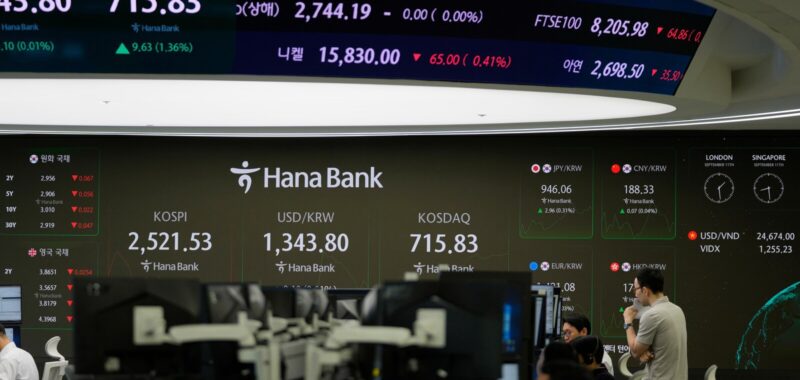TOKYO — Global shares traded mostly lower Wednesday after Wall Street drifted to a mixed finish.
France’s CAC 40 added 0.3% in early trading to 7,429.55, while Germany’s DAX rose 0.4% to 18,340.84. Britain’s FTSE 100 fell 0.4% to 8,202.70. U.S. shares were set to drift lower with Dow futures at 40,667.00, down 0.3%. S&P 500 futures lost 0.3% to 5,488.50.
Investors were watching for any market impact from the debate between the U.S. presidential candidates, Vice President Kamala Harris and former President Donald Trump.
The value of the U.S. dollar has increased against peers in the past when expectations of a Trump reelection have strengthened, among other moves that have come to be known as part of the “Trump trade,” due in part to his calling for tariffs.
In currency trading, the U.S. dollar fell to 141.66 Japanese yen from 142.41 yen. The euro cost $1.1045, up from $1.1023.
The U.S. dollar fell at one point to 140-yen levels after a Japanese central bank official was quoted by Japanese media as indicating the Bank of Japan was getting ready to raise interest rates, a move anticipated for some time.
Japan’s benchmark Nikkei 225 dropped 1.5% to finish at 35,619.77, while Australia’s S&P/ASX 200 lost 0.3% to 7,987.90.
South Korea’s Kospi slipped 0.4% to 2,513.37 after data showed the nation’s seasonally adjusted unemployment rate edged down to 2.4% in August 2024 from 2.5% in July, the lowest level in a year as the number of unemployed people declined.
Hong Kong’s Hang Seng dipped 0.7% to 17,108.71, while the Shanghai Composite slipped 0.8% to 2,721.80.
The U.S. Federal Reserve is turning its focus away from stifling high inflation and toward protecting the economy. The debate is focused on how much the Fed will cut the federal funds rate, which has been sitting at a two-decade high.
Reports coming this week on U.S. inflation could influence the size of the Fed’s upcoming cuts. The worst case for the Fed would be if inflation were to reaccelerate when the job market is weakening, because helping either of those would require opposing moves.
Economists expect the latest report on inflation to show prices for U.S. consumers were 2.6% higher in August than a year earlier. That would be a slowdown from July’s inflation rate of 2.9%
In energy trading, benchmark U.S. crude rose $1.20 to $66.95 a barrel. Brent crude, the international standard, gained $1.11 to $70.30 a barrel.
___
Stan Choe contributed to this report from New York.

